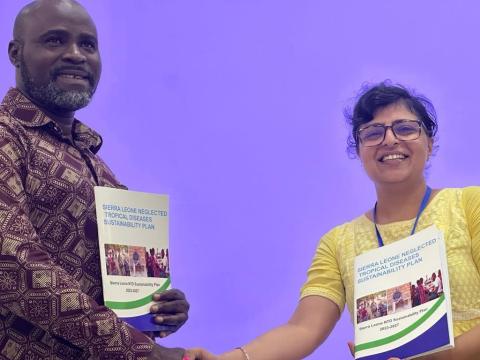By Nasratu Kargbo
Not for profit organization Hellen Keller International has launched a sustainability plan to tackle neglected tropical diseases (NTDs) in Sierra Leone.
According to its Chief Programme Officer Shawn Baker the effort is to ensure that NTDs are controlled and eliminated in the country and that care is given to those whose situation has worsened.
Baker, on the 18th May 2023 in an interview with pressmen after the launch said: “The sustainability plan is to recognize all the progress that Sierra Leone has made, but also to lay out what are the key steps, to make sure this elimination drop is completed and to the people for whom prevention is too late, get the services needed”.
He emphasized that those people for whom prevention is too late should be provided with the services needed to mitigate the impact, citing that those who have swollen scrotum might get surgery whilst those with swollen feet get care to reduce the impact of the swollen legs.
He said the country has made massive progress in addressing NTDs, referencing elephantiasis which according to him used to be endemic in all districts in the country, but has ceased transmission in all districts except Bombali which is on the verge of eliminating the disease.
Baker added that River Blindness now recorded a few cases and that Snail Fever is no longer widespread. “I think the one that remains a burden are worms which affect the whole population especially toddlers and school- aged children”, he noted.
He said for such progress to be sustained, authorities such as the Ministry of Health and Sanitation should continue showing leadership and ensure that surveillance is in place.
Highlighting the main areas they want to address as per the plan, the Programmes Officer said they intend to look at three thematic areas which are mass drug administration, adequate surveillance and provision of services and care for people whose situations cannot be prevented.
When asked how the plan will impact the communities, Baker explained a story about a woman who has elephantiasis and was neglected and abandoned by her husband, family and community after she was accused of being a witch.
He noted that “with the elimination of those diseases, we won’t have such tragic stories anymore”. He added that the woman has received support, stressing that the disease cannot be reversed but managed, explaining that she has regained her dignity and family.
Baker added that there is also a huge economic consequence, explaining NTDs have the tendency to stop one from working and destroy livelihoods. He said they are not diseases that directly kill people, but lead to poverty and poor economic growth.
Dayo Spencer-Walter Acting Director of Health in Sierra Leone for United States Agency for International Development (USAID) said the launch of the plan clearly indicates that authorities are determined to ensure they put an end to NTDs.
Deputy Chief Medical Officer in the Ministry of Health and Sanitation (MoHS) Dr. Musa Kabba stated that he believes the plan will strengthen and integrate NTD services into the country’s national health system, which according to the doctor will facilitate the progress controlling and eliminating the diseases.
"The plan ensures that all NTD activities are well coordinated, resources are utilized effectively and efficiently to deliver life-saving interventions to all communities where NTD activities will be implemented", Dr. Kabba stated.
Spencer-Walter assured that USAID is ready to work with the government and other institutions to control and put an end to NTDs. "This is a very critical piece of the puzzle. For Sierra Leone to continue on the path of elimination and control of NTDs, sustainability needs to be thought through and planned for.”
Sierra Leone's NTD Sustainability Plan will span through 2023 to 2027. According to the press release by Helen Keller International, the plan is an important step towards achieving national and global benchmarks which include W.H.O.’s roadmap targets and milestones for NTDs prevention, elimination and or control (2021-2030), and for ensuring a healthy population, amongst others.
Copyright © 2023 Politico (22/05/23)








